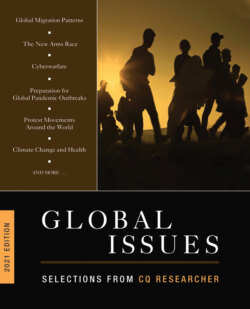Читать книгу Global Issues 2021 Edition - Группа авторов - Страница 82
Current Situation Korean Diplomacy Fizzles
ОглавлениеMany analysts believe North Korean leader Kim is embarking upon a defiant path for 2020 with his year-end policy speech announcing he no longer feels bound by his self-imposed moratorium on missile tests. Kim cited President Trump’s failure to reciprocate with any relief from sanctions that have hobbled North Korea’s economy.
“If the U.S. persists in its hostile policy toward the DPRK, there will never be the denuclearization on the Korean Peninsula, and the DPRK will steadily develop necessary and prerequisite strategic weapons for the security of the state until the U.S. rolls back its hostile policy,” Kim said, using the initials of his country’s official name, the Democratic People’s Republic of Korea.59
Nevertheless, Trump continues to believe his personal rapport with Kim holds the promise for an historic agreement that would see the communist nation give up its nuclear weapons.
“Look, he likes me, I like him, we get along,” Trump said about his relationship with Kim while speaking to reporters on New Year’s Eve at his Mar-a-Lago resort. “But he did sign a contract, he did sign an agreement talking about denuclearization. … I think he’s a man of his word, so we’re going to find out.”60
In his speech, Kim appeared to leave the door open to further diplomacy by saying the nuclear tests would resume if Washington refused to drop its demands that North Korea first fully denuclearize. Further complicating any future negotiations is North Korea’s definition of denuclearization, which includes the removal of all U.S. nuclear forces from South Korea.
Since then, there has been no sign that Trump has softened his position. But Trump sent Kim birthday greetings in early January in a gesture that analysts said was aimed at defusing tensions and preparing the ground for another summit. In a response, carried by the official Korean Central News Agency, North Korean Foreign Ministry adviser Kim Kye Gwan said it would be “stupid” to expect that Kim’s personal relationship with Trump would be enough to restart negotiations.61
U.S. President Barack Obama and Russian President Dmitry Medvedev shake hands after signing the New Strategic Arms Reduction Treaty (New START) in 2010 in Prague. The pact committed the two nations to major nuclear arms cuts.
JOE KLAMAR/AFP via Getty Images
Talks will resume, he said, when Washington agrees to the proposal Kim put forward at his Hanoi summit with Trump last June: That North Korea would dismantle its principal nuclear facility at Yongbyon in exchange for the partial lifting of U.N. sanctions on North Korea. “There is no need for us to be present in such talks, in which there is only unilateral pressure,” Kim Kye Gwan said, “and we have no desire to barter something for other things at the talks, like traders.”62
On Capitol Hill, the eight Democratic senators who wrote to Trump in December urged him to come up with a comprehensive strategy to advance denuclearization talks, including a “phased process to verifiably dismantle the Yongbyon nuclear complex and other nuclear facilities.”63
But Kori Schake, who has served in senior policy positions at the Pentagon, State Department and National Security Council in both Democratic and Republican administrations, says the prospects for any progress toward North Korea’s denuclearization appear slim. “The Trump administration doesn’t appear to think that agreements require any compromise from them,” says Schake. “Most negotiations work better when your position isn’t ‘Give me everything first, and then I’ll give you something.’ They’re not invested in a process that builds confidence as it builds momentum.”
According to several independent experts who closely follow North Korean issues, the administration’s position has thwarted Stephen Biegun, Trump’s top North Korea negotiator, who has been unable to persuade Trump and Secretary of State Mike Pompeo to adopt a step-by-step negotiating process.
In an appearance on ABC’s “This Week” just before the new year, Robert O’Brien, Trump’s fourth national security adviser, echoed the president’s hard line, warning the United States will respond if North Korea resumes nuclear weapons and long-range ballistic missile tests.
